#Jammu Lok Sabha Seat
Text
Jammu LS seat records nearly 72 pc polling
JAMMU — The Jammu parliamentary constituency, where 22 candidates are in the fray, saw peaceful polling and recorded nearly 72 per cent voter turnout on Friday in the second phase of the Lok Sabha elections, officials said.
The overall polling figure in the constituency this time was lower than the last general election in 2019 when 74 per cent voters exercised their franchise.
The officials said…
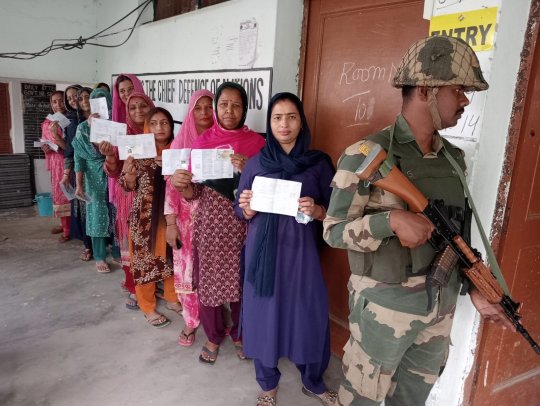
View On WordPress
0 notes
Text
In An NC Versus PDP Contest, Agendas Are Identical But Acrimonious Barbs Define The Battle
“Given that almost 90% of the population in this constituency is Koshur, the influence of other ethnic groups on election results will be minimal. This is because there is a widespread popular inclination among people of all ethnic backgrounds to use their voting rights as a means to express their disapproval of the revocation of Article 370, regardless of their specific ethnic identity.”
Latief…
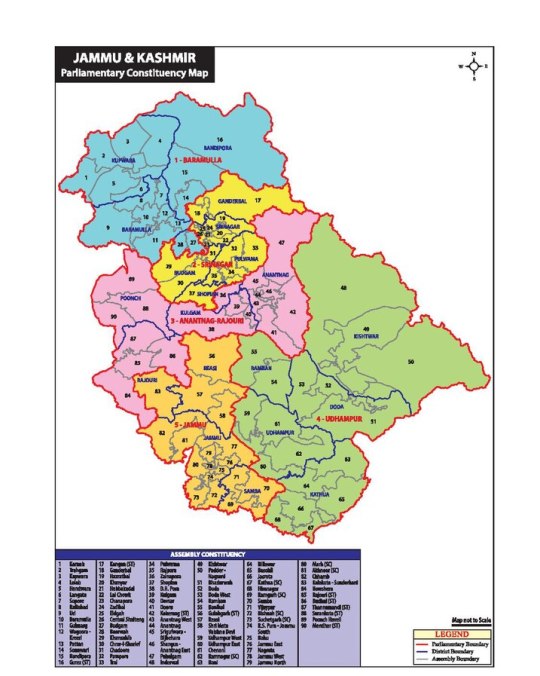
View On WordPress
#1975#Abrogation of Article 370#Aga Ruhullah#Bakerwals#Begum Abdullah#Congress#Delimitation of Lok Sabha seats#Dogras#Ghulam Mohammad Bakshi#Gujjars#INC#Indira-Abdullah Accord#J&K#Jammu#Jammu and Kashmir#Kashmiri Pandits#Kashmiris#National Conference#Paharis#Pandit Nahru#PDP#Peoples&039; Democratic Party#Shameem Ahmed Shameem#Sheikh Mohammad ASbdullah#Shopian#Srinagar Parliamentary Constituency#Waheed-ur-Rehman Parra
0 notes
Text
12 notes
·
View notes
Text
Narendra Modi Story
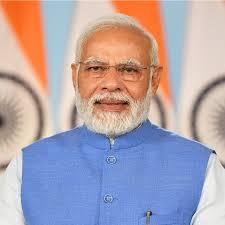
Narendra Modi (born September 17, 1950, Vadnagar, India) Indian politician and government official who rose to become a senior leader of the Bharatiya Janata Party (BJP). In 2014 he led his party to victory in elections to the Lok Sabha (lower chamber of the Indian parliament), after which he was sworn in as prime minister of India. Prior to that he had served (2001–14) as chief minister (head of government) of Gujarat state in western India.
After a vigorous campaign—in which Modi portrayed himself as a pragmatic candidate who could turn around India’s underperforming economy—he and the party were victorious, with the BJP winning a clear majority of seats in the chamber. Modi was sworn in as prime minister on May 26, 2014. Soon after he took office, his government embarked on several reforms, including campaigns to improve India’s transportation infrastructure and to liberalize rules on direct foreign investment in the country. Modi scored two significant diplomatic achievements early in his term. In mid-September he hosted a visit by Chinese President Xi Jinping, the first time a Chinese leader had been to India in eight years. At the end of that month, having been granted a U.S. visa, Modi made a highly successful visit to New York City, which included a meeting with U.S. Pres. Barack Obama.
As prime minister, Modi oversaw a promotion of Hindu culture and the implementation of economic reforms. The government undertook measures that would broadly appeal to Hindus, such as its attempt to ban the sale of cows for slaughter. The economic reforms were sweeping, introducing structural changes—and temporary disruptions—that could be felt nationwide. Among the most far-reaching was the demonetization and replacement of 500- and 1,000-rupee banknotes with only a few hours’ notice. The purpose was to stop “black money”—cash used for illicit activities—by making it difficult to exchange large sums of cash. The following year the government centralized the consumption tax system by introducing the Goods and Services Tax (GST), which superseded a confusing system of local consumption taxes and eliminated the problem of cascading tax. GDP growth slowed from these changes, though growth had already been high (8.2 percent in 2015), and the reforms succeeded in expanding the government’s tax base. Still, rising costs of living and increasing unemployment disappointed many as grandiose promises of economic growth remained unfulfilled.
This disappointment registered with voters during the elections in five states in late 2018. The BJP lost in all five states, including the BJP strongholds of Madhya Pradesh, Rajasthan, and Chhattisgarh. The rival Indian National Congress (Congress Party) won more state assembly seats than the BJP in all five elections. Many observers believed that this portended bad news for Modi and the BJP in the national elections set for the spring of 2019, but others believed that Modi’s charisma would excite the voters. Moreover, a security crisis in Jammu and Kashmir in February 2019, which escalated tensions with Pakistan to the highest point in decades, boosted Modi’s image just months before the election. With the BJP dominating the airwaves during the campaign—in contrast to the lacklustre campaign of Rahul Gandhi and Congress—the BJP was returned to power, and Modi became India’s first prime minister outside of the Congress Party to be reelected after a full term.
In his second term Modi’s government revoked the special status of Jammu and Kashmir, stripping it of autonomy in October 2019 and bringing it under the direct control of the union government. The move came under intense criticism and faced challenges in court, not only for the questionable legality of depriving Jammu and Kashmir’s residents of self-determination but also because the government severely restricted communications and movement within the region.
In March 2020, meanwhile, Modi took decisive action to combat the outbreak of COVID-19 in India, swiftly implementing strict nationwide restrictions to mitigate the spread while the country’s biotechnology firms became key players in the race to develop and deliver vaccines worldwide. As part of the effort to counter the economic impact of the COVID-19 pandemic, Modi undertook executive action in June to liberalize the agricultural sector, a move that was codified into law in September. Many feared that the reforms would make farmers vulnerable to exploitation, however, and protesters took to the streets in opposition to the new laws. Beginning in November, massive protests were organized and became a regular disruption, particularly in Delhi.
Modi’s policies backfired in 2021. Protests escalated (culminating in the storming of the Red Fort in January), and extraordinary restrictions and crackdowns by the government failed to suppress them. Meanwhile, despite the remarkably low spread of COVID-19 in January and February, by late April a rapid surge of cases caused by the new Delta variant had overwhelmed the country’s health care system. Modi, who had held massive political rallies ahead of state elections in March and April, was criticized for neglecting the surge. The BJP ultimately lost the election in a key battleground state despite heavy campaigning. In November, as protests continued and another set of state elections approached, Modi announced that the government would repeal the agricultural reforms.
2 notes
·
View notes
Text
My #Vote My Duty
#election #loksabha #vidhansabha #fourthphase
13th May :- Around 17.7 crore people will be eligible to vote in the fourth phase of Lok Sabha #elections in 96 seats spread across ten states and Union Territories.
#Polling will also be held in 175 Assembly seats in #AndhraPradesh and 28 seats in #Odisha where the term of #assemblies are ending in June.
According to the #ElectionCommission, 1,717 candidates trying their luck in 96 #LokSabha seats. All Lok Sabha seats in #Andhra Pradesh (25) and #Telangana (17) will go to #polls on 13th May besides #constituencies in #UttarPradesh (13), #Maharashtra (11), #MadhyaPradesh and #WestBengal (8 each), #Bihar (5), #Odisha and #Jharkhand (4 each) and #Jammu&Kashmir (1).
#Advocate #niharranjan #medicolegal #pharma #legal #trademark #election #fourthphase
Over 19 lakh polling officials have been deployed across 1.92 lakh polling stations for phase 4 polls. The EC said 364 Observers -- 126 General Observers, 70 Police Observers, 168 Expenditure Observers -- for the phase 4 have already reached their constituencies days before the polls.
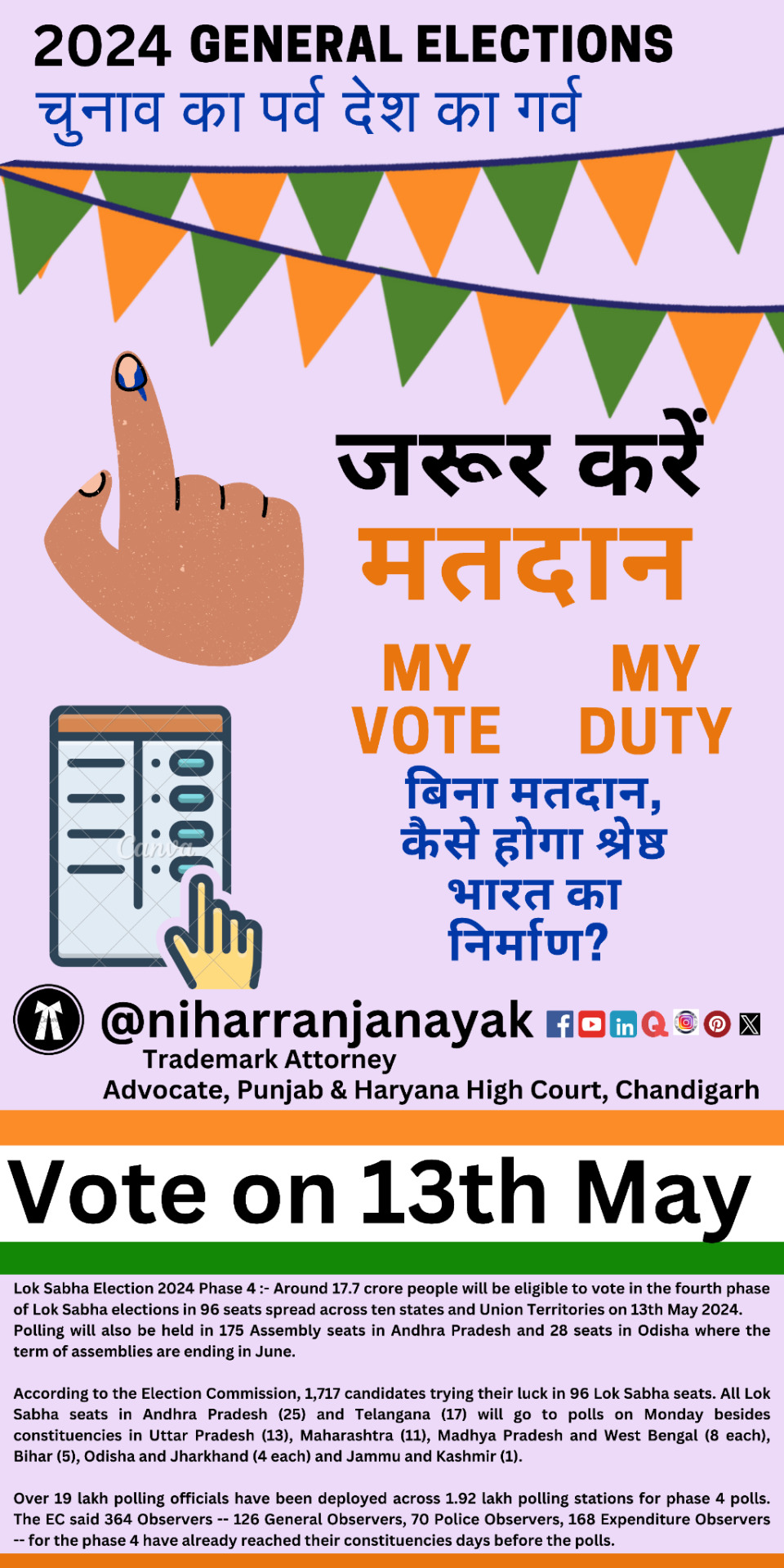
0 notes
Text
Bihar, Jharkhand, Odisha Lok Sabha Elections 2024: Phase 4 Polling Timing, Major Candidates and Constituencies | India News
Lok Sabha elections for 5 seats in Bihar and 4 seats in Jharkhand and Odisha are scheduled for the 4th phase on May 13, and the counting of votes will be held on June 4. In the fourth phase, polling will be held in 96 constituencies across 10 States. Elections will be held in Andhra Pradesh (25), Bihar (5), Jammu and Kashmir (1), Jharkhand (4), Madhya Pradesh (8), Maharashtra (11), Odisha (4),…
View On WordPress
0 notes
Text
Today in Politics: PM Modi and Rahul Gandhi Campaign in Kerala; SC to Hear Kejriwal’s Plea Against ED Arrest
Prime Minister Narendra Modi and former Congress president Rahul Gandhi are set to make significant appearances in Kerala on Monday as part of their electoral campaigns leading up to the Lok Sabha polls.
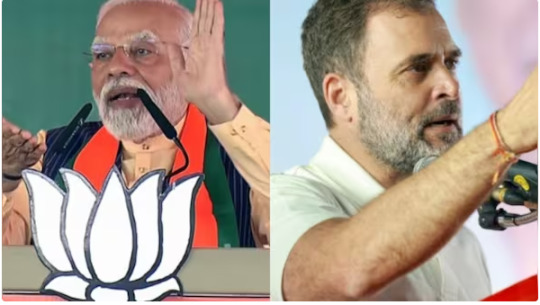
Modi is scheduled to address two public meetings in Thiruvananthapuram and Thrissur, aiming to bolster the BJP's presence in a state where it has historically struggled to secure Lok Sabha seats. The BJP's candidates include Union minister Rajeev Chandrashekar and actor Suresh Gopi. This marks Modi's sixth visit to Kerala this year, reflecting the party's determination to make inroads into the state's political landscape.
Rahul Gandhi, on the other hand, will hold a public meeting in his constituency Wayanad, where he is seeking re-election for a second term. His visit is expected to galvanize support for the United Democratic Front (UDF), which had won 19 out of 20 seats in Kerala in the 2019 elections. Rahul's candidacy is seen as a strategic move to consolidate the Congress party's position in the state.
In a separate development, the Supreme Court is set to hear Delhi Chief Minister Arvind Kejriwal's plea challenging his arrest by the Enforcement Directorate (ED). Kejriwal faces allegations of money laundering related to the Delhi excise policy case. The court's decision will have significant implications for the ongoing legal battle surrounding Kejriwal's arrest and the broader political landscape in Delhi.
Meanwhile, BJP leaders continue their campaign efforts across various states. Union Home Minister Amit Shah will address rallies in Tripura and Manipur, while Union Defence Minister Rajnath Singh will attend a rally in support of BJP candidate Jitender Singh in Jammu and Kashmir. Congress leaders, including Priyanka Gandhi Vadra and Mallikarjun Kharge, are also actively engaged in campaigning, underscoring the intense political activity leading up to the elections.
1 note
·
View note
Text
National Conference Takes Aim at Mehbooba Mufti's Home Turf with LS Candidate Pick
The National Conference (NC) has thrown down the gauntlet by selecting Mian Altaf Ahmed Lahrvi, a seasoned MLA and Gujjar religious leader, as its candidate for the Anantnag-Rajouri parliamentary seat – the very constituency belonging to NC's alliance partner, Mehbooba Mufti of the Peoples Democratic Party (PDP). Lahrvi's nomination signals NC's intent to contest all three Lok Sabha seats in the Kashmir Valley, putting a spotlight on the future of the Peoples Alliance for the Gupkar Declaration (PAGD).
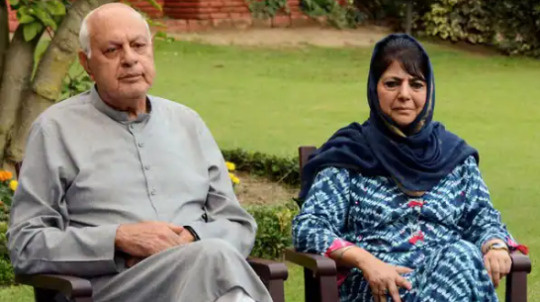
With a political landscape reshaped by recent delimitation exercises, the Anantnag-Rajouri seat now spans across diverse demographics, encompassing Kashmiri Muslims as well as the Gujjar and Pahari communities. By fielding Lahrvi, the NC hopes to appeal to the Gujjar community while potentially challenging the traditional stronghold of Valley-based parties in the region.
This move sets the stage for a riveting electoral showdown, especially considering the BJP's aspirations to expand its footprint in Kashmir. With intricate constituency dynamics and the evolving political narrative, the battle for Anantnag-Rajouri promises to be one to watch.
As the PDP mulls its electoral strategy amidst shifting alliances and dynamics, the stage is set for a compelling electoral saga in one of Jammu and Kashmir's most consequential constituencies.
0 notes
Text
Ghulam Nabi Azad Wiki, Age, Political Career, Wife, Net Worth, Religion, Family & More

Ghulam Nabi Azad is a Former Indian Politician and Leader of the Opposition in the Rajya Sabha. Currently, Ghulam Nabi is resigning from all his posts, and positions and also from the party.
In this blog, you'll read about Ghulam Nabi Azad Wiki, Biography, Age, Family, Wife, Net Worth, Education, Nationality & More.
Ghulam Nabi Azad Wiki, Age, Biography
Ghulam Nabi was born on 7 March 1949 in Bhaderwah, district Doda, Jammu, and Kashmir. He is 73 years old now. He belongs to the Indian National Congress (INC) who was the 7th chief minister of Jammu and Kashmir. He served from 2005 to 2008 as the 7th chief minister of J&K.
Also, he was the Minister of Health and Family Welfare. Ghulam Nabi also served as the Leader of the opposition in Rajya Sabha from 2014 to February 2021.
Full Name
Ghulam Nabi Azad
Nick Name
Ghulam Nabi
Profession
Former Indian Politician Leader
Birth Date
7 March 1949
Place of Birth
Bhaderwah, district Doda, Jammu, and Kashmir
Age
73 Years Old
Home town
Bhaderwah, district Doda, Jammu, and Kashmir
Famous For
Resigning from all his Post, Positions and also from the Party
Political Party
Indian National Congress
Zodiac Sign
Pisces
Ghulam Nabi Azad Political Career
Ghulam Nabi began his career in 1973, after working as the secretary for the Block Congress Committee in Bhalessa. And 2 years later, he was appointed as the President of the J&K Pradesh Youth Congress. In 1980, he was selected as the President of the All-India Youth Congress.
He has also served as the Minister of Parliamentary Affairs in Manmohan Singh's government until 27 October 2005, when he was selected as the Chief Minister of Jammu and Kashmir.
Ghulam Nabi led the Congress party successfully in the 2002 Assembly election in J&K. He was awarded the Padma Bhushan Award, which is India's 3rd highest civilian award. In 2022, the Indian Government for the field of Public Affairs by President Ram Nath Kovind.
In June 2014, when the National Democratic Alliance won a majority in the Lok Sabha and formed the Union government, Ghulam Nabi was selected as the leader of the opposition in the Rajya Sabha, where Congress still held the majority.
In 2015, Ghulam Nabi got re-elected to the Rajya Sabha from J&K, despite the PDP-BJP alliance holding a majority of seats in the Legislative Assembly.
Ghulam Nabi Azad Resigns From INC
Ghulam Nabi resigned from the post of chairman of the J&K Congress campaign committee hours after his appointment. Sonia Gandhi (President of the Indian National Congress) accepted the resignation from Ghulam Nabi.
On 26th August, he resigned from all the primary members of the Indian National Congress after citing annoyance in its top leadership.
Ghulam Nabi Azad Education
Ghulam Nabi attended a local school in his village for his schooling education. Later for higher studies he moved to Jammu and completed his Bachelor of Science degree from G.G.M. Science College.
After that, he also completed a Master's in Zoology Degree from the University of Kashmir, Srinagar in 1972.
Ghulam Nabi Azad Parents
Ghulam Nabi's father's name is Rahamatullah Batt and his mother's name is Basa Begum.
Ghulam Nabi Azad Wife, Children
Ghulam Nabi's marital status is married and his wife's name is Shameem Dev Azad. She is a well-known Kashmiri singer. They both married in the year 1980. They have a son named Saddam Nabi Azad and a daughter named Sofiya Nabi Azad.
Ghulam Nabi Azad Net Worth
Ghulam Nabi's estimated net worth is $8 million and his Primary income is from social work and as a politician.
Ghulam Nabi Azad Nationality, Religion
Ghulam Nabi holds the nationality of Indian. Ghulam Nabi's religion is Islamic.
Nationality
Indian
Religion
Islamic
Ghulam Nabi Azad Social Media Accounts
Twitter
Facebook
FAQS About Ghulam Nabi Azad
Q1) Who is Ghulam Nabi Azad?
Ans) Ghulam Nabi is a Former Indian Politician Leader from the Indian National Congress (INC) who was the 7th chief minister of Jammu and Kashmir.
Q2) What is the age of Ghulam Nabi Azad?
Ans) Ghulam Nabi was born on 7 March 1949 in Bhaderwah, district Doda, Jammu, and Kashmir. He is 73 years old now.
Q3) What is the Net Worth of Ghulam Nabi Azad?
Ans) Ghulam Nabi's estimated net worth is $8 million and his Primary income is from social work and as a politician.
Q4) What is the Nationality of Ghulam Nabi Azad?
Ans) Ghulam Nabi holds the nationality of Indian.
Q5) Who is the Wife of Ghulam Nabi Azad?
Ans) Ghulam Nabi's marital status is married and his wife's name is Shameem Dev Azad. She is a well-known Kashmiri singer. They both married in the year 1980.
Also, Read About-Richard Harmon
Read the full article
#GhulamNabiAzadage#GhulamNabiAzadbiography#GhulamNabiAzadchildren#GhulamNabiAzadeducation#GhulamNabiAzadnationality#GhulamNabiAzadnetworth#GhulamNabiAzadparents#GhulamNabiAzadpoliticalparty#GhulamNabiAzadreligion#GhulamNabiAzadwife#GhulamNabiAzadwiki
0 notes
Text
ADGP Jammu reviews security ahead of voting in Jammu LS seat
JAMMU — Additional Director General of Police (ADGP), Jammu zone, Anand Jain, on Wednesday chaired a meeting to oversee election preparedness in Jammu and Kashmir’s Reasi district, police said.
Reasi is part of the Jammu Lok Sabha constituency, which is going to polls in the second phase on April 26.
Accompanied by Deputy Inspector General (DIG), Udhampur-Reasi range, Rayees Mohd Bhat, the ADGP…
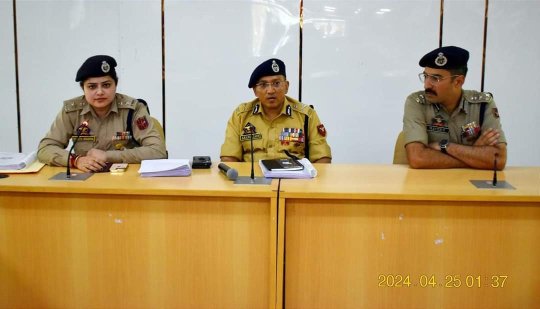
View On WordPress
0 notes
Photo
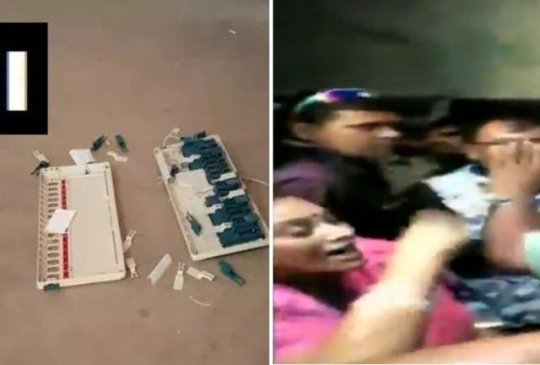
Lok Sabha Chunav 2019: Violence In Fifth Phase Of Voting In Bengal, Bihar And Jammu Kashmir – पांचवें चरण का मतदान: कहीं ग्रेनेड फेंका तो कहीं तोड़े गए ईवीएम, बंगाल में भारी हिंसा लोकसभा चुनाव के पांचवें चरण मे�� हिंसा के बीच मतदान हुआ। उत्तर प्रदेश, पश्चिम बंगाल और बिहार के कुछ बूथों पर जमकर हिंसा हुई है। जम्मू- कश्मीर के पुलवामा जिले में एक मतदान केंद्र पर ग्रेनेड हमला हुआ, तो वहीं हावड़ा बूथ पर टीएमसी सांसद सुरक्षाकर्मी से ही भीड़ गईं। बिहार के सारण के एक बूथ पर एक शख्स ने ईवीएम तोड़ दिया जिसके बाद उसको गिरफ्तार कर लिया गया। कहां-कहां हिंसा हुई जानिए।
#Bengal#bengal lok sabha seats#Bihar#bihar lok sabha seats#bjp#bsp#Chunav#congress#Election#evm#India News in Hindi#Jammu#jdu#Kashmir#Latest India News Updates#Lok#lok sabha elections 2019#madhya pradesh lok sabha seats#narendra modi#Phase#rahul gandhi#rajasthan lok sabha seats#rjd#rld#Sabha#samajwadi party#tmc#violence#Voting#ईवएम
0 notes
Text
A Dialectical talk with Dr.K Sanjeev on Kashmir issue.
Our country for maintaining peace, harmony and to live with spirit of fraternity is sufficient for world to know our remarks on democracy, keep away the statements of opposition because they are opposition their job is to oppose the ruling government.
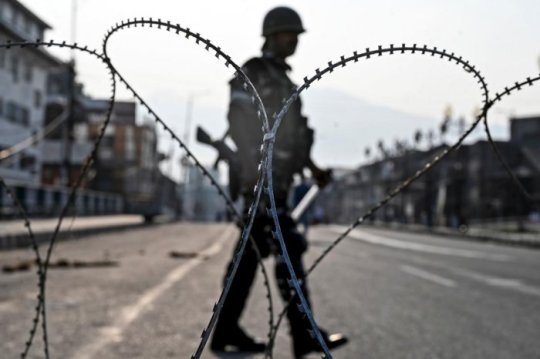
At present, you are the spokesperson of the Bihar BJP Teacher’s Cell of the ruling party and you will aware about the removal of Article 370 and 35 ‘A’; from the BJP headquarter to the university. What do people think about this decision of the Modi government?
Dr.K Sanjeev: Modi jee has done tremendous initiative to remove Article 370 and 35 ‘A’ from Indian constitution. Common people are much aware about this issue. Not only people of valley but all the Indian citizens wanted peace in valley. They are generally saying that bifurcation of Jammu and Kashmir in two territory is not in the real sense but in first instance it is real.
What is your personal opinion over the Kashmir issue?
Dr.K Sanjeev: In my opinion Kasmir issue was of Nehruvian origin. It is our PM’s hard political will that solved the issue without wasting a drop of blood. As we know that our country’s people live like family, wherein different kinds of family member are dwells with distinct ideas and opinions, and if some seldom conflicts occurs in family then it is the job of a responsible head of family to solve their conflicts. the issue of Jammu and Kashmir is our country’s matter and we are able to tackle it as well. ‘And when you are born in the world’s largest democracy, do we now need a third group to solve our issues? Answer must be ‘Never’
Opposition parties described Modi government’s decision as ‘the suicide of democracy’. what do you think?
Dr. K Sanjeev: Our democracy is way of life, when we are talking about the true democracy in a multicultural society then we have to maintain its harmony by treating people, race, caste, religion, and sex(Gender) equally and not only to treat equally by act but also to enable different cultures within a community to flourish and to treat each other with mutual respect. Our country always wanted to maintain peace, harmony and to live with spirit of fraternity. these are sufficient for world to know our remarks on democracy, keep away the statements of opposition because they are opposition their job is to oppose the ruling government.
There is absence of education or you can say that there were not any way to acquire education. What do you think about it’s causes?
Dr.K Sanjeev: J & K has special status prior to the removal of Article 370 & 35 ‘A’. No Indian law was valid in the state. The state was of its own constitution and the state was not abide by Indian Constitution. Even Right to Education (RTE) Act, 2009 was not applicable in the state. The pupils of the age group of 6-14 years were deprived from their educational rights. Though, both the Kendriya Vidyalaya and Navodaya Vidyalaya was there in Valley, but the parents were afraid to see the turmoil and militancy in valley. That is why they didn’t sent their children to respective neighbourhood schools. No parent wanted by their heart wanted their children to be un-educated and to join militant or terrorist group. Presently valley is in peace and education will run like bullet train and it will change the living standard of people because 'Education is considered to be tool that is responsible for bringing the paradigm shift in life i.e. from simple life to the dignified life.
Is it true that people of Kashmir will be treated equally after this decision?
Dr.K Sanjeev: Of course ! Our Constitution ensures the 'Right to life and liberty’ and freedom means liberty and liberty means life. Life, Liberty and Property is natural rights of a human being and we elect the government to protect these natural rights and this decision is all about these rights. So, there is no question that the Kashmiri people will be treated equally or not? The condition which was continued from 1952 to 06th Aug, 2019 there were not any expectation of social change, but now people have opportunity to get job, education, to purchase property, and so on. And this will lead to social mobility, stability and sustainability of the life of the Valley people.
Is there any role of Prime Minister?
Dr.K Sanjeev: Yes! the Prime Minister and Home Minister duo were firm over this decision. Abolition of Article 370 and 35 ‘A’ was already is the prime part of the BJP’s Election Manifesto. In Parliamentary Election (2019) the BJP has got majority by wining 503 parliamentary seats across the country. The party has already passed the bill earlier in Rajya Sabha and later in Lok Sabha. Our Prime Minster’s political will power has made the dream true.
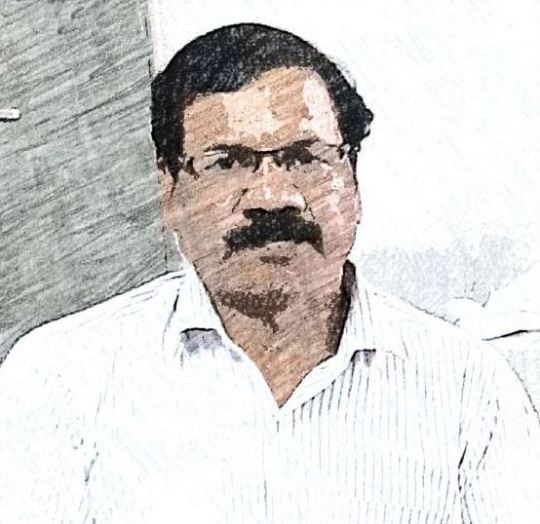
Dr.K Sanjeev is currently the Member of Senate, Patna University, Spokesperson of Bihar State BJP Teacher’s Cell
1 note
·
View note
Text
State-wise list of constituencies in 17th Lok Sabha
Soon after the announcement of Rajasthan Assembly Elections 2018, the Lok Sabha Elections is going to happen in India. The Rajasthan Politicians are already preparing their plan to earn healthy votes for victory. To get all the updates, you need to read Rajasthan News regularly.
About Lok Sabha Election 2019:
Lok Sabha Elections 2019 is going to be conducted in the month of April-May. Lok Sabha is the Lower House of Parliament which is made by the Members of Parliament. This year, the prominent political parties include United Progressive Alliance (UPA) aka Congress and Bhartiya Janata Party (BJP).
Total Lok Sabha Seats:
Currently, there is a total of 543 seats in the Lok Sabha. There are total 552 seats as per the Constitution of India. Out of them, 530 seats will be selected from States, 20 seats will be selected from the Union Territory and 2 seats will be occupied by the Anglo-Indians. The President of India has the right to select 2 Ango-Indians for Lok Sabha.
State-wise list of constituencies in 17th Lok Sabha Election 2019
State/Union TerritoryLok Sabha seats
Andhra Pradesh- 25
Arunachal Pradesh - 2
Assam - 14
Bihar - 40
Chhattisgarh - 11
Goa - 2
Gujarat - 26
Haryana - 10
Himachal Pradesh - 4
Jammu and Kashmir - 6
Jharkhand - 14
Karnataka - 28
Kerala - 20
Madhya Pradesh - 29
Maharashtra - 48
Manipur - 2
Meghalaya - 2
Mizoram - 1
Nagaland - 1
Odisha - 21
Punjab - 13
Rajasthan - 25
Sikkim - 1
Tamil Nadu - 39
Telangana - 17
Tripura - 2
Uttar Pradesh - 80
Uttarakhand - 5
West Bengal - 42
Andaman and Nicobar Islands - 1
Chandigarh - 1
Dadra and Nagar Haveli - 1
Daman and Diu - 1
Lakshadweep - 1
NCT of Delhi - 7
Puducherry - 1
1 note
·
View note
Text
Lok Sabha election 2019 || Dates declared || Schedule
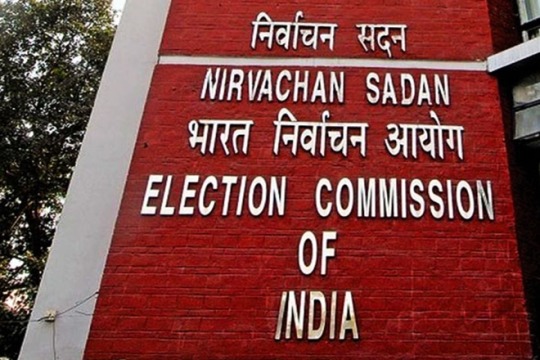
LOk sabha elections dates are declared by the Election commission after such a long meeting held in Delhi and loksabha election will be held from the month of April and May that is 11, 18, 23, 29 April and 6, 12, 29 May of 2019.
more than 10 lakh aprox booth will be establish for votings for the election of Lok sabha elections 2019.Lok Sabha election 2019
Loksabha Elections Phase wise and Places where elctions Took place Date wise
Phase 1 (April 11)
1. Andhra Pradesh: 25 seats
2. Arunachal Pradesh: 2 seats
3. Assam: 5 seats
4. Bihar: 4 seats
5. Chhattisgarh: 1 seat
6. Jammu and Kashmir: 2 seats
7. Maharashtra: 7 seats
8. Manipur: 1 seat
9. Meghalaya: 2 seats
10. Mizoram: 1 seat
11. Nagaland: 1 seat
12. Odisha: 4 seats
13. Sikkim: 1 seat
14. Telangana: 17 seats
15. Tripura: 1 seat
16. Uttar Pradesh: 10 seats
17. Uttarakhand: 5 seats
18. West Bengal: 2 seats
19. Andaman and Nicobar Islands: 1 seat
20. Lakshadweep: 1 seat
Phase 2 (April 18)
1. Assam: 5 seats
2. Bihar: 5 seats
3. Chhattisgarh: 3 seats
4. Jammu and Kashmir: 2 seats
5. Karnataka: 14 seats
6. Maharashtra: 10 seats
7. Manipur: 1 seat
8. Odisha: 5 seats
9. Tamil Nadu: 39 seats
10. Tripura: 1 seat
11. Uttar Pradesh: 8 seats
12. West Bengal: 3 seats
13. Puducherry: 1 seat
Phase 3 (April 23)
1. Assam: 4 seats
2. Bihar: 5 seats
3. Chhattisgarh: 7 seats
4. Gujarat: 26 seats
5. Goa: 2
6. Jammu and Kashmir: 1 seat
7. Karnataka: 14 seats
8. Kerala: 20 seats
9. Maharashtra: 14 seats
10. Odisha: 6 seats
11. Uttar Pradesh: 10 seats
12. West Bengal: 5 seats
13. Dadra and Nagar Haveli: 1 seat
14. Daman and Diu: 1 seat
Phase 4 (April 29)
1. Bihar: 5 seats
2. Jammu and Kashmir: 1 seat
3. Jharkhand: 3 seats
4. Madhya Pradesh: 6 seats
5. Maharashtra: 17 seats
6. Odisha: 6 seats
7. Rajasthan: 13 seats
8. Uttar Pradesh: 13 seats
9. West Bengal: 8 seats
Phase 5 (May 6)
1. Bihar: 5 seats
2. Jammu and Kashmir: 2 seats
3. Jharkhand: 4 seats
4. Madhya Pradesh: 7 seats
5. Rajasthan: 12 seats
6. Uttar Pradesh: 14 seats
7. West Bengal: 7 seats
Phase 6 (May 12)
1. Bihar: 8 seats
2. Haryana: 10 seats
3. Jharkhand: 4 seats
4. Madhya Pradesh: 8 seats
5. Uttar Pradesh: 14 seats
6. West Bengal: 8 seats
7. Delhi: 7 seats
Phase 7 (May 19)COMMENT
1. Bihar: 8 seats
2. Jharkhand: 3 seats
3. Madhya Pradesh: 8 seats
4. Punjab: 13 seats
5. West Bengal: 9 seats
6. Chandigarh: 1 seat
7. Uttar Pradesh: 13 seats
8. Himachal Pradesh: 4 seats
Read the full article
1 note
·
View note
Text
Andhra Pradesh Lok Sabha Elections 2024: Phase 4 Polling Timing, Major Candidates and Constituencies | India News
Lok Sabha elections for all 25 seats in Andhra Pradesh are scheduled on May 13 in the 4th phase and the counting of votes will be held on June 4. In the fourth phase, polling will be held in 96 constituencies across 10 states. Elections will be held in Andhra Pradesh (25), Bihar (5), Jammu and Kashmir (1), Jharkhand (4), Madhya Pradesh (8), Maharashtra (11), Odisha (4), Telangana (17). Uttar…
View On WordPress
0 notes
Text
Modi in Udhampur, Rahul and Stalin Unite in Coimbatore, and Eshwarappa's Rebel Move
The political arena heats up as the BJP gears up for the Lok Sabha polls. Prime Minister Narendra Modi is slated to address a rally in Udhampur, Jammu and Kashmir, while Union Home Minister Amit Shah focuses on Madurai, Tamil Nadu.
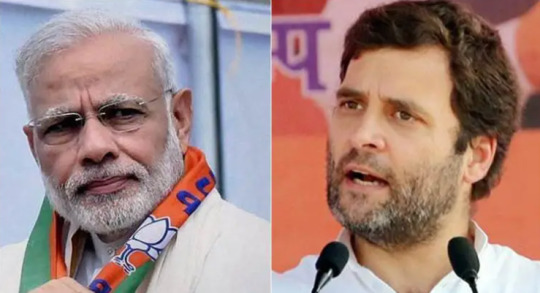
Modi's rally, in support of BJP's candidate and Union minister Jitendra Singh, prompts heightened security measures, including a ban on drone flights. Singh vies for re-election from Udhampur's Lok Sabha seat.
Meanwhile, Shah's itinerary includes campaigning for Sivaganga candidate T Dhevanathan Yadav in Karaikudi. He'll also visit temples in Thirumayam and Madurai during his Tamil Nadu tour.
In Coimbatore, an INDIA bloc rally sees Rahul Gandhi and M.K. Stalin advocating support for opposition candidates. Coimbatore, a crucial battleground, witnesses BJP's K Annamalai facing off against AIADMK and DMK contenders.
In Karnataka, former Deputy Chief Minister K S Eshwarappa, a BJP rebel, stands firm in filing his nomination for the Shivamogga Lok Sabha seat. Despite attempts at reconciliation from the BJP's top brass, Eshwarappa remains determined in his defiance.
Stay tuned for more updates as the political landscape unfolds in the run-up to the Lok Sabha elections.
0 notes